HEFAMAA Prioritises Patient Safety
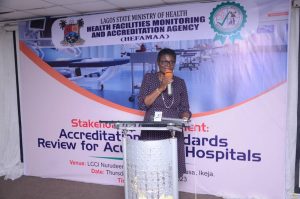
The Executive Secretary of Health Facilities Monitoring and Accreditation Agency (HEFAMAA), Dr. Abiola Idowu.
The Health Facility Monitoring and Accreditation Agency has expressed its intention to attain international recognition through the accreditation of health facilities to guarantee patients’ safety.
The Chairman of the HEFAMAA Board, Dr Yemisi Solanke-Koya, stated this today at a stakeholders meeting held at the Lagos Chamber of Commerce and Industry (LCCI) in Alausa, Ikeja on the review of standards for Acute Care Hospitals in Lagos to get international accreditation.
She underscored the importance of patient safety noting that the stakeholders meeting was premised on how to add value to patients and ensure they get quality healthcare.
She further explained that the agency has been at the forefront of setting required minimum standards for operations of health facilities both in the public and private health sector, adding that there is a need for the agency to seek global recognition through the International Society for Quality in Health Care (ISQUA).
“In view of the targeted ISQUA recognition, the agency identified the need to meet all relevant stakeholders in the health sector to brainstorm on how to get international accreditation in a way that health providers in the state will be able to embrace the provisions of the accreditation policy,” Solanke-Koya stated.
The Commissioner for Health in Lagos State, Professor Akin Abayomi who was represented by the Director of Administration, Medical Training and Programmes, Dr Funmilayo Sokunbi noted that developing this accreditation plan aligns with and builds on HEFAMAA’s strategic plan developed a few years back to improve healthcare quality through setting standards and regulating facilities in Lagos State. “The current effort will lead to better healthcare service delivery across the state,” the Commissioner assured.
The Executive Secretary of HEFAMAA, Dr. Abiola Idowu, while speaking on the theme, “Stakeholder Engagement: Accreditation Standards Review for Acute Care Hospitals” revealed that the agency is reviewing the standards for Acute Care Hospitals in a way that is acceptable to Lagos and Nigeria such that the agency will not be working out of context.
“The essence of having standards is to comply with set regulations that will be reviewed by external people, like external peer review that will ensure improvement in the quality of care and improve health outcomes,” Idowu said.
She listed the areas covered under the Acute Care Hospitals, including, diagnostic and laboratory services, patient and care, patient safety, hospital structures, and operational processes among others.
On the importance of the accreditation, the Executive Secretary stated, “The hospitals are putting themselves out to say we have attained the minimum, we want you to come and mark us as being excellent and so in terms of stamping out quackery, what we are targeting at is to ensure there is licensing of all health facilities in the state.
“We look at the structure of the facilities, the basic equipment, we also look at the staffing, we want to ensure there is adequate medical staffing in the facility, so in doing that, we are ensuring that every medical personnel working in health facilities are qualified to participate,” she added.
Making a presentation on the theme of the meeting titled, “HEFAMAA Hospitals Accreditation Standards in Development – Stakeholders Engagement” the Chief Executive Officer, Habevit Healthcare and Chairman of SQHN Committee, Dr. Olujimi Coker, listed the benefits of Accreditation to include the improvement of overall professional development, knowledge, and competencies in systematic ways while also fostering a culture of quality and safety.
“It helps reduce variation and cost, improve efficiency and patient outcomes, mitigate risks and liability costs and above all it raises community confidence in the services provided by the health care organization,” he added.
Coker noted that the purpose of regulation is to provide assurance that minimally acceptable standards are achieved, to improve performance and quality and to provide accountability for levels of performance (individual & organisation) and value for money.
One of the participants who is a Quality Improvement Specialist, Dr. Ajibike Oyewunmi, said in developed countries, there are standards to state what quality of care is needed in different parts of the world.
“Those parts of the world already have standards so that hospitals and care providers will aspire to these healthcare standards, so we are excited that Lagos State has decided that they want to push it forward.
“Setting standards means that patients know when they get to the hospital, what kind of care they get and healthcare providers know how to deliver this healthcare to the people in such a way that it is safe, timely and effective.
Faces of Participants:

Head of Research & Statistics, HEFAMAA, Dr. Olorunfemi Olonire.
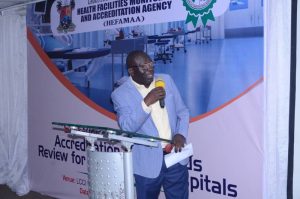
Director/Head of Monitoring & Inspection, HEFAMAA, Dr Daniel Olayinka.
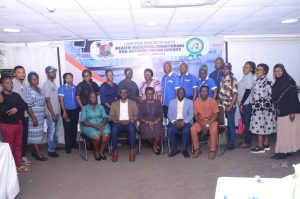
The HEFAMAA Family Front seat: L-R: Mrs Titilope Oluwole, Dr Olorunfemi Olonire, ES, HEFAMAA, Dr Abiola Idowu, Dr Daniel Olayinka and Dr Godswill Eboma.

Representative of the Commissioner for Health (Prof. Akin Abayomi) and the Permanent Secretary, Ministry of Health, Lagos State, Dr Olufunmilayo Sokunbi (Director, Medical Administration, Training and Programmes, LSMOH)


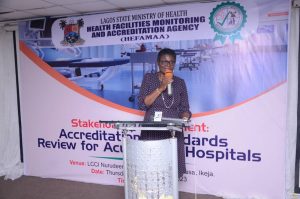



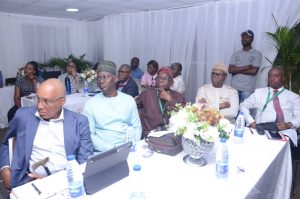
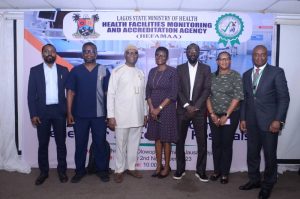
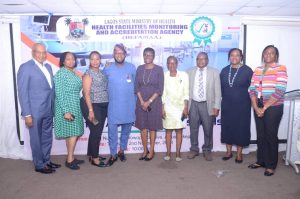

Left: Head of Administration & Human Resources, HEFAMAA, Mr Abdulazeez Jimoh (Pa J’)
